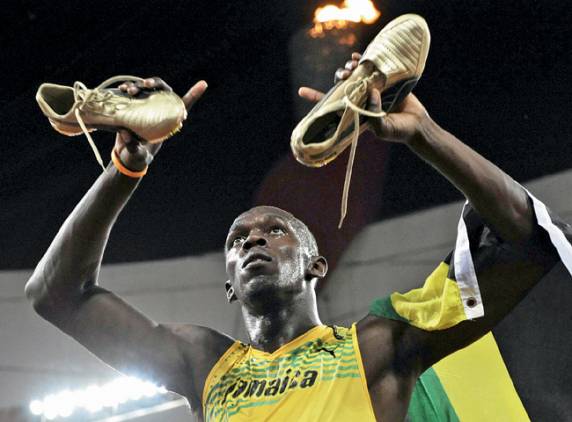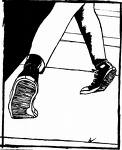• Vocabulary … [01] ⇔ [02] ⇔ [vid] ⇔ [vidquiz]⇐
A-K ⇐… Sports illustrated …⇒ L-Z
∞ Guessing Game⇐[pairwork sports worksheet]
¤ Extreme sports⇐
 Sports classified as extreme are always changing. People who enjoy these sports (usually young and fearless!) tend to consider themselves part of a subculture, and they might refer to them simply as «action sports».
Sports classified as extreme are always changing. People who enjoy these sports (usually young and fearless!) tend to consider themselves part of a subculture, and they might refer to them simply as «action sports».
The X-Games are the Olympics of extreme sports! They are held twice a year in the summer and winter: the best athletes from around the world are invited to compete and try to outdo each other with the biggest, highest, fastest, most difficult tricks. A trick is a stunt, an action like a jump, a flip, or a spin. Competitors are give a score for their tricks by a panel of judges. They compete to win medals (gold, silver, and bronze), AND a lot of money! They also try to impress the fans with never-before-seen tricks.
• ‘ PLAY’ – ‘DO’ – ‘GO’ [collocations] … Quizzes ⇒[01] ⇔ [02]⇐
 |
 |
 |
| Go skiing | Do karate | Play tennis |
There are three verbs that collocate with sports and other free time activities: go, do and play, but they are not interchangeable:
- Go is used with activities and sports that end in -ing. The verb go here implies that we go somewhere to practice this sport: go swimming.
- Do is used with recreational activities and with individual, non-team sports or sports in which a ball is not used, like martial arts, for example: do a crossword puzzle, do athletics, do karate.
- Play is generally used with team sports and those sports that need a ball or similar object (puck, disc, shuttlecock…). Also, those activities in which two people or teams compete against each other: play football, play poker, play chess.
| Go | Do | Play |
| riding | aerobics | badminton |
| jogging | gymnastics | table-tennis |
| hitch-hiking | taekwondo | football |
| fishing | judo | basketball |
| sailing | karate | chess |
| windsurfing | kung-fu | cricket |
| skiing | ballet | board games |
| snowboarding | excercise | snooker |
| swimming | yoga | hockey |
| dancing | athletics | baseball |
| skating | archery | rugby |
| cycling | a crossword puzzle | volleyball |
| running | tai chi | squash |
NOTICE: We use ‘do’ in informal English to talk about activities that take a certain time, or are repeated (like jobs and hobbies). In the same way we ‘do’ collocates with  household chores (‘do the cleaning/washing-up /shopping…’) we can use ‘do’ with most -ing forms; only, we replace the definite article with other quantifiers:
household chores (‘do the cleaning/washing-up /shopping…’) we can use ‘do’ with most -ing forms; only, we replace the definite article with other quantifiers:
÷ ÷ ÷
•→ Idioms [Sports – Games – Athletics] ⇐
Φ ‘Punching Bag’ [a 2012 tune by Josh Turner] ⇓
 • Glossaries . . .
• Glossaries . . .
• Hiking & Trekking . . .
• Pictionary: ⇒camping⇐
WALK_DON’T RUN …
⇒[01]⇐ / ⇒[02]⇐ / ⇒[03]⇐ / ⇒[04]⇐ / ⇒[05]⇐
Ways of walking ⇒
♣ Mind your step!
⇒[quiz 01] ⇔ [quiz 02] ⇔ [quiz 03]⇐
¤ Swimming ⇓
•→ Swimming idioms + exercises⇐
≈ The swimming song by Earl Scruggs ↓ [animated run & walk cycles]
This summer I went swimming – This summer I might have drowned
But I held my breath, I kicked my feet – Moved my arms around – I moved my arms around
This summer I swam in the ocean and I swam in a swimming pool
Salt my wounds, chlorined my eyes I’m a self-destructive fool – Self-destructive fool
This summer I did the back stroke and you know that that’s not all
I did the breast stroke, the butterfly and the old Australian crawl – The old Australian crawl
This summer I swam in a public place and a reservoir to boot
At the latter I was informal, at the former I wore my suit – I wore my swimming suit
Oh, this summer I did swan dives and jack-knives for you all
And once when you weren’t looking I did a cannon-ball – I did a cannon-ball
This summer I went swimming – This summer I might have drowned
But I held my breath, I kicked my feet and moved my arms around – I moved my arms around
÷ ÷ ÷
¤ Olympics _ London, 2012

¶ «You Can’t Have It _. . . And that is that_»
I still can’t believe it – they didn’t let Usain Bolt keep the relay as a souvenir just after winning his umpteenth medal at 2012 London Olympics and breaking the world record for the 400m relay! I mean, he did earn the yellow dildo, didn’t he?
Besides mean and miserable, the gesture suggests a very un-British short-sighted view on business: a worthless gadget is offered the chance of multiplying its value by millions, and somebody simply says ‘no’.
You’re making History, Mr Bolt; the British gesture, we´ll forget.
¤ Olympics _ Munich, 1972
The 1972 Summer Olympics in Munich, the first in Germany since the 1936 Games in Nazi Berlin, are today remembered primarily for its «Munich Massacre.» Black September, a Palestinian terrorist organization, took eleven athletes and coaches from the Israeli team (along with a West German police officer) hostage, all of whom were eventually murdered, most during an unsuccessful rescue attempt.
Visions of Eight (1973) is an excellent record of the 1972 Munich Olympics, a collage imaginatively recording the event from varied perspectives, each with a different focus. Acclaimed filmmakers from around the world – Milos Forman, Yuri Ozerov, Mai Zetterling, Arthur Penn, Michael Pfleghar, Kon Ichikawa, Claude Lelouch and John Schlesinger.– each contribute a segment averaging about 10 minutes in length. For instance, Forman focused on the comic aspect of the games; Lelouch kept his sights on the losers rather than the winners; and Mai Zetterling examined obsession in the form of weightlifting. The movie does not attempt to comprehensively document the ’72 Olympics and does not aim for a unified vision. Instead, it showcases the talents of these directors under the inspiration of this most dramatic of gatherings.
• Olympia ⇓ [Leni Riefenstahl_1938]
Jesse Owens won four gold medals . . .
«Hitler didn’t snub me – it was FDR who snubbed me. The president didn’t even send me a telegram.»








Deja un comentario